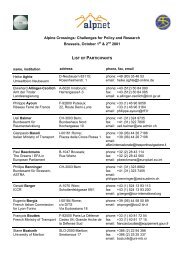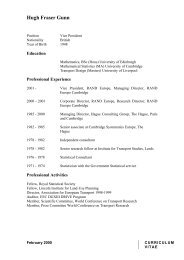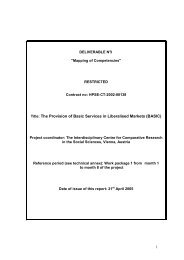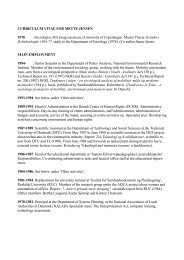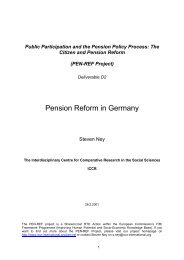The Housing Dimension of Welfare Reform - the ICCR
The Housing Dimension of Welfare Reform - the ICCR
The Housing Dimension of Welfare Reform - the ICCR
You also want an ePaper? Increase the reach of your titles
YUMPU automatically turns print PDFs into web optimized ePapers that Google loves.
deliberation with service providers about what needs to be changed in<br />
order to render <strong>the</strong> service provision more comprehensive, user-friendly<br />
and respectful <strong>of</strong> <strong>the</strong> users’ life experiences and social conditions.<br />
Fur<strong>the</strong>rmore, such deliberations can operate as learning environments for<br />
both <strong>the</strong> providers and users <strong>of</strong> social services: for <strong>the</strong> providers to help<br />
<strong>the</strong>m understand user needs; for <strong>the</strong> users to help <strong>the</strong>m to gain an insight<br />
into <strong>the</strong> complexities <strong>of</strong> decision processes <strong>of</strong> social services and how<br />
arising problems need not always reflect lack <strong>of</strong> interest or commitment<br />
on <strong>the</strong> part <strong>of</strong> <strong>the</strong> social workers.<br />
Equally important in this regard is <strong>the</strong> setting <strong>of</strong> standards that reflect<br />
user needs and requirements. Standards are defined as a set <strong>of</strong> principles<br />
and procedures which set out requirements for <strong>the</strong> provision <strong>of</strong> a quality<br />
service. <strong>The</strong>y are identified as essential to <strong>the</strong> achievement <strong>of</strong> <strong>the</strong><br />
ultimate goal <strong>of</strong> enhancing <strong>the</strong> principles <strong>of</strong> social rights and human<br />
dignity. <strong>The</strong> EUROHOME-IMPACT project has looked at standardsetting<br />
for homeless services operating non-permanent accommodation,<br />
in particular. <strong>The</strong>se however can by and large be extended to most social<br />
services operating in <strong>the</strong> field <strong>of</strong> housing and targeting persons at risk <strong>of</strong><br />
homelessness or already homeless and regardless <strong>of</strong> whe<strong>the</strong>r <strong>the</strong> service<br />
provided in terms <strong>of</strong> housing comprises permanent or non-permanent<br />
housing. Below we reproduce <strong>the</strong> most important and reproducable<br />
elements:<br />
Service culture. Services need to acknowledge <strong>the</strong> complexity <strong>of</strong><br />
problems associated with social exclusion and homelessness and be<br />
equipped to address <strong>the</strong> sensitivity <strong>of</strong> people in personal crisis. <strong>The</strong><br />
policy principles guiding aims and work practices should be explicitly<br />
formulated. Eligibility criteria and admission procedures should be made<br />
public and presented to <strong>the</strong> users in a transparent and clear manner.<br />
Enrolment procedures and service rules should not infringe on basic<br />
personal rights and freedoms <strong>of</strong> individuals. <strong>The</strong> staff and voluntary<br />
workers need to be recruited in view <strong>of</strong> <strong>the</strong>ir qualification and aptitude to<br />
manifest sensitivity to <strong>the</strong> needs <strong>of</strong> users and specific features <strong>of</strong> <strong>the</strong><br />
target group <strong>of</strong> <strong>the</strong> service. Services operating transitory accommodation<br />
should strive to promote <strong>the</strong> transition to independent accommodation<br />
while being responsive to difficulties which some users may experience<br />
in making this transition.<br />
Staff management. Management refers to administration <strong>of</strong> funds and <strong>the</strong><br />
overall running <strong>of</strong> service. <strong>The</strong> line <strong>of</strong> responsibility and <strong>the</strong> decision<br />
making structure should be clear regarding staff supervision.<br />
Management should provide ongoing support to <strong>the</strong> staff and voluntary<br />
workers in terms <strong>of</strong> work load and stress management. Management<br />
should encourage exchange <strong>of</strong> information and networking <strong>of</strong> its staff<br />
with o<strong>the</strong>r service providers in view <strong>of</strong> maximising pr<strong>of</strong>essional<br />
EUROHOME-IMPACT FINAL REPORT 59



